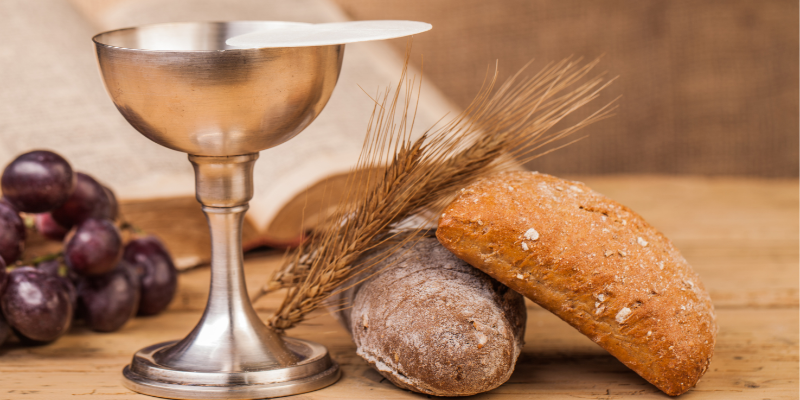Holy Communion: What Is It And Why Is It Significant?

Some call it the “Last Supper” others call it the “Lord’s Supper” or the “Sacrament”, we call it Holy Communion. But what is it, and why do we do it?
All the Gospels (Matthew, Mark, Luke, and John) record consistently that Jesus had a last supper with His disciples before His crucifixion. This meal, which consisted of bread and wine is what we call Holy Communion. So in a sense, the Holy Communion is a simple but significant meal.
We understand from the Gospels that Jesus ate this meal on the day the Jews celebrate the Festival of Unleavened Bread, which is called the Passover (Luke 22:1, 7-20). This is significant. The Passover meal was eaten by the Israelites for the first time as they were led out of Egypt by God’s mighty hand. It had its own regulations:
-
“No foreigner may eat it.” (Ex. 22:43) When Jesus ate it, He ate it with his disciples. That’s why when we eat it in Church today, we warn that non-Christians among us must not eat it. It’s a covenant meal for those who are in Christ Jesus.
-
“It must be eaten inside the house” (Ex. 22:46). When Jesus ate it with His disciples, He asked for a room to be prepared. Whilst we eat it in our church buildings, we must be careful not to make this a command. There will be circumstances when believers are constrained to eat it outside. This does not invalidate it. The context in Exodus was that the angel of death was on the loose in Egypt and God wanted the Israelites protected inside, with the blood of the lamb on their door post. (Ex. 12:7-13)
-
“The Whole community of Israel must celebrate it” (Ex. 12:47). It is a meal for all Christians. We also encourage our children to eat it, under the guidance of their parents.
-
Foreigners who eat, must have their males circumcised (Ex. 12:48). This is why we ask non-Christians who may want to eat it to first confess their sins and accept Jesus as their Lord and Saviour. We also encourage a self-reflection and confession of sins for everyone who partakes in the Lord’s Supper. Confession and forsaking of our sin is a way of circumcising our hearts.
The Passover represents God’s salvation of Israel from the bondage of slavery. Jesus said, we should eat the Lord’s Supper “in remembrance of Him”, just like the Israelites were told to celebrate the Passover as a remembrance of God’s salvation (Ex.13:8-10).
The Passover lamb in Exodus points to Jesus. He is the fulfilment of the Passover experience in Egypt. Just like the Passover was a covenant between God and the children of Israel, the Holy Communion is “the new covenant in my blood”, said Jesus (Luke 22:20). By the blood of the lamb, in Egypt, the Israelites were saved from death. By the new covenant of Jesus’ blood shed on the cross, we are brought from death to life. The Holy Communion signifies and reminds us of the forgiveness of our sins and the cleaning we receive as children adopted into God’s holy family.
Some argue that because it is the Lord’s Supper, it must be eaten in the night. It is true that the Israelites ate it at night and Jesus most likely ate it at night with His disciples. However, the significance of the meal is not in the period of day it is eaten, but in the understanding of what it means and the people who should eat it. Others argue that it should be done weekly because Jesus said “in remembrance of me” and we should remember Him often. We should probably do it more often, but there is no regulation for the frequency. I will say we should do it as often as possible. We currently do it once a month in our Sunday service, but we want to encourage Life Groups, families and friends to do it regularly.
Holy Communion is also a celebration of Jesus’ presence with us. We eat as part of his body, the church. We recognise that we are doing it because we enjoy the fellowship of believers of which He is Lord. Whenever we gather, whether we are two, three or in our hundreds, Jesus is in our midst. He is always present. The celebration of the Lord’s Supper brings His presence to the fore.
When the Corinthian Church started abusing the Lord’s Supper, Paul wrote to correct them. He notes that those who eat it “in an unworthy manner” will be guilty of sinning against the body and the blood of the Lord (1 Cor. 11:27). In fact, some who ate unworthily among the Corinthian church became weak, sick and some even died. It therefore means when we eat it in a worthy manner, it will work for our healing, strength and give us abundant life in Christ Jesus.
There is also a sense of the anticipation that one day we will eat and drink with Christ in Heaven. Holy Communion is therefore also significant because it makes us look forward to the coming of the Lord and renews our expectation of eternal life in Christ Jesus. As we gather this Sunday for the first time this year in person, I want us to come prepared to thank God for His saving grace, celebrate Holy Communion with the understanding of its significance and bring to the fore, the very fact that the Lord is coming back soon. Until then, let's remember to partake in the Holy Communion at home with our families, in Life Groups and with other Christian friends.